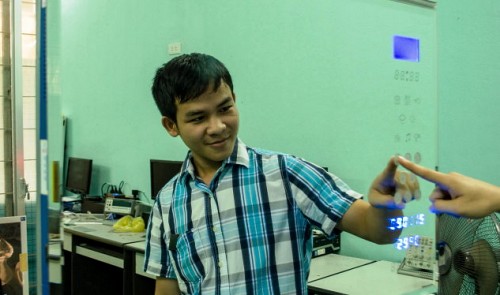"Smart mirror" developers want to seek a sponsor
A group of students from Da Nang have created a hi-tech multifunctional mirror which they call a ‘smart mirror.’
The PIV-VK group including Le Tu Hieu, Phan Ngoc Diep, and Nguyen Huu Vinh from Class 10DT2 of the E – Telecommunication Department of the University of Science and Technology under the University of Da Nang has turned a normal mirror into a multifunctional tool applied with advanced technology.
The mirror is equipped with a 10cm-thick electronic circuit, a touch screen, and status indicators.
It allows users to listen to music and read books while checking their looks in front of it.
The 50cm x 70cm mirror can also read messages, give weather information, and is capable of connecting to a mobile phone’s Bluetooth system, as well as informing users of their health condition via statistics on height, weight, and heartbeat.
 |
| A member of the PIV-VK group and the smart mirror (Photo: Tuoi Tre) |
Phan Ngoc Diep, leader of the PIV-VK group, said the idea of making the mirror came up when the assemblage attended the Texas Instruments MCU Contest 2014 held by the U.S.- based Texas Instruments Inc. from March to November last year.
“We initially aimed to create a technology product with healthcare functions, including height and weight measurement,” Diep said. “We won the second prize.”
However, realizing that the product was quite boring and not attractive to users, the group came up with an idea that integrates all the technology into a mirror, an item that is used daily.
According to Diep, the group has also met difficulties, especially financial problems. Costs to make the mirror have reached VND6 million (US$280) from the school’s funding and their own pockets, and could reach even higher.
Another problem is it is not easy to find components for the smart mirror.
“Besides some components which were sponsored by the contest’s organizers, we had to go to Ha Noi and Ho Chi Minh City to buy or order them from overseas,” group member Le Tu Hieu said.
The mirror’s design is also a challenge. Since motherboard manufacturing technology in the central region is not as developed as it is in the big cities, the motherboard is quite big.
“The smart mirror is basically finished but our group is still not happy,” Diep said. “We want to find a company or a sponsor to work with and develop and improve the product, bringing the smart mirror to customers.”
“The mirror could only be in full swing when it is applied to life.”
Associate Professor Doctor Nguyen Van Tuan, head of the E – Telecommunication Department of the University of Science and Technology, said he thinks highly of the product’s potential.
“They have mastered microcontroller technology, and successfully integrated it with a mobile-based platform,” he said. “The mirror is customizable and can suit all kinds of consumers.”